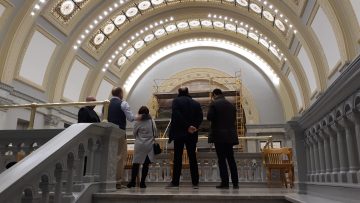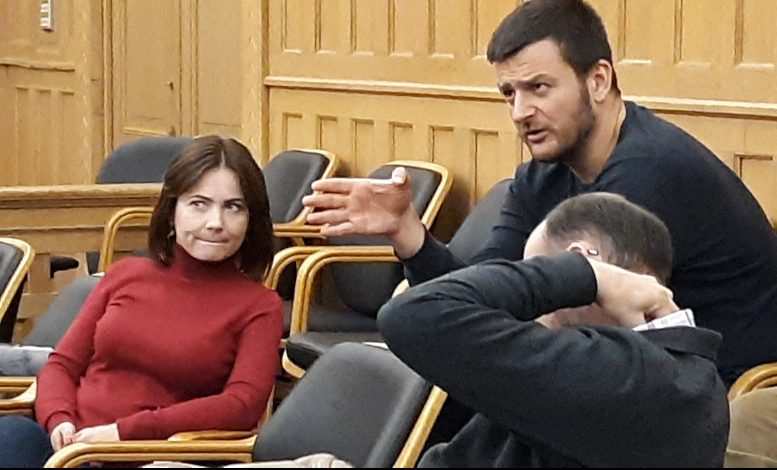By JAN LARSON McLAUGHLIN
BG Independent News
As the Ukrainians walked in the courtroom, they noticed something was missing – a cage for the accused.
“No cage,” explained Wood County Common Pleas Judge Matthew Reger. “We would never have a cage.”
In fact, several efforts are made in U.S. courts to ensure the defendant gets a fair trial, the judge said.
“The defendant can’t be in shackles,” Reger said, as the translator put his words into Ukrainian. “They can’t be in anything but street clothes.”
The Ukrainian Parliament members toured the courthouse on Sunday as part of the Open World Leadership Center’s effort to allow the Ukrainian delegation to learn about U.S. government.
During their stay in the Toledo area, they also met with Wood County Sheriff Mark Wasylyshyn – who is of Ukrainian descent – and the Wood County Commissioners.

Wood County Common Pleas Judge Matt Reger shows courthouse to Ukrainian delegation.
The number of of delegates was fewer than planned, since some of the parliament members stayed home because of the recent conflict with Russia. Last month, Russia seized some Ukrainian ships and sailors in a reported attempt to take over a vital sea route. Twenty-four Ukrainian sailors are still being held in a Russian prison.
Bill Hilt, of Perrysburg, said the visiting Ukrainians are quite worried about the Russian aggression and the world’s slow response to defend their nation.
“They’re very upset about what they deem as Russian aggression,” said Hilt, who is part of the World Affairs Council of Northwest Ohio hosting the Ukrainians. “They are from three different parties, but they are unified in that.”
The parliament members are disappointed in the lack of support from NATO, the European Union and the U.S., Hilt said.
Ukraine gave up its nuclear weapons in exchange for worldwide defense. “It was with the understanding there will be some help with defense,” Hilt said. But no one is stepping up, he added.
The Ukrainians are particularly troubled by the reports spread to the media that their president is behind the Russian aggression in an effort to bolster his chances in the March election.
That is “more Russian propaganda,” the Ukrainians have told Hilt.
“They are very appreciative of the help they have received, but the challenges are greater than the aid given,” he said.
The three parliament members visiting are watchdogs for corruption in their country. They share similar visions, but have different routes for getting there, the translator Sergei Vladov said.
Making it difficult is the poverty in some areas.
“The people of Ukraine are struggling even to meet their basic needs,” Vladov said.
Reger, who gave the delegation a tour of the county courthouse, spent some time with the American Bar Association working with attorneys and helping to create a criminal code for courts in Georgia, which went through similar challenges as Ukraine.
“Georgia probably had more success with democratic institutions and the transition to power,” he said.
With the Ukrainians sitting in the jury box in his courtroom, Reger explained that the U.S. court system can be viewed as tilted in favor of the defendant.
“The state has the obligation to provide all the evidence it has to the defense,” he said. But the defense only has to share the evidence it is presenting at trial.
“My job is to protect procedural justice,” Reger said.
The judge also talked about how some state laws are at odds with federal laws – for example the legalization of marijuana use in some states.
“You’ve come here at a time when there’s a lot of reform in our criminal justice system,” Reger said. Some people want reform of the nation’s prison system, while others want tougher penalties for offenders, he said.
The Ukrainian delegation asked questions about corruption in the courts in the U.S. They talked about the “vicious cycle” of judges taking bribes in their country.
“It would be naive for me to tell you there is no corruption in the U.S.,” Reger said. Though he pointed out that very few rulings are overturned in the appeal process.
The parliament members also asked about the ability of poor people to get fair trials in the U.S. Reger explained that those defendants who can’t afford an attorney are appointed one by the courts.
However, he added, “it would be naive to tell you that a person with money can’t hire an exceptional attorney.”
Hilt said Open World Leadership Center and World Affairs Council of Northwest Ohio provide a valuable bridge between nations – allowing these kinds of conversations.
“Anything to help the people of Northwest Ohio become more internationally connected,” Hilt said.

